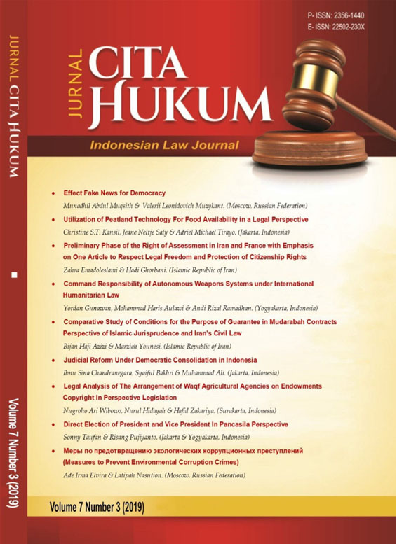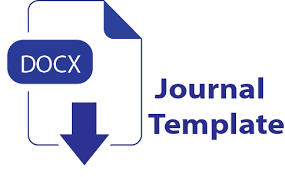Judicial Reform and Democratic Consolidation in Indonesia
DOI:
https://doi.org/10.15408/jch.v7i3.12228Keywords:
Judicial Reform, Judicial Independence, Judicial Accountability, Democratic ConsolidationAbstract
Abstract
Constitutional Reform after fall of Soeharto’s New Order bring favorable direction for judiciary. Constitutional guarantee of judicial independence as regulated in Art 24 (1) of the 1945 Constitution, closing dark memories in the past. In addition, in Art 24 (2) of the 1945 Constitution decide the Judiciary is held by the Supreme Court and the judicial bodies below and a Constitutional Court. Such a strict direction of regulation plus the transformation of the political system in a democratic direction should bring about the implementation of the independent and autonomous judiciary. But in reality, even though in a democratic political system and constitutional arrangement affirms the guarantee of independence, but it doesn’t represent the actual situation. There some problem which still remains, such as (i) the absence of a permanent format regarding the institutional relationship between the Supreme Court, the Constitutional Court and Judicial Commission, and (ii) still many efforts to weaken judiciary through many ways such criminalization of judge. Referring to the problem above, then there are gaps between what “is” and what “ought”, among others, First, by changes political configuration that tend to be more democratic, the judiciary should be more autonomous. But in reality, various problems arise such as (i) disharmony in regulating the pattern of relations between judicial power actors, (ii) various attempts to criminalize judges over their decisions, (iii) judicial corruption. Second, by the constitutional guarantee of the independence of the judiciary, there will be no legislation which reduced constitutional guarantee. But in reality, many legislation or regulations that still not in line with a constitutional guarantee concerning judicial independence. This paper reviews and describes in-depth about how to implement constitutional guarantees of judicial independence under democratic consolidation after fall of new order and conceptualize its order to strengthening rule of law in Indonesia
Keyword: Judicial Reform, Judicial Independence, Judicial Accountability, Democratic Consolidation
Abstrak
Perubahan UUD 1945 membawa arah yang menguntungkan bagi cabang kekuasaan kehakiman di Indonesia. Penjaminan kemerdekaan kekuasaan kehakiman sebagaimana diatur dalam Pasal 24 (1) UUD 1945 seperti menutup ingatan kelam di masa lalu. Selain itu, dalam Pasal 24 (2) UUD 1945 yang menentukan kekuasaan kehakiman dipegang oleh Mahkamah Agung dan badan-badan peradilan di bawahnya dan Mahkamah Konstitusi. Dengan dasar ini, tidak ada landasan hukum sedikitpun bagi Presiden atau DPR untuk mengintervensi cabang kekuasaan kehakiman. Tetapi dalam kenyataannya, meskipun dalam sistem politik yang demokratis dan pengaturan konstitusional menegaskan jaminan kemerdekaan namun kenyataannya tidak mewakili situasi aktual. Terdapat beberapa masalah yang masih tersisa, seperti (i) tidak adanya format permanen mengenai hubungan kelembagaan antara Mahkamah Agung, Mahkamah Konstitusi dan Komisi Yudisial, (ii) masih banyak upaya untuk melemahkan peradilan melalui banyak cara kriminalisasi hakim. Mengacu pada masalah di atas, maka ada kesenjangan antara apa yang senyatanya dan apa yang seharusnya antara lain, Pertama, perubahan konfigurasi politik yang cenderung lebih demokratis, kekuasaan kehakiman harus lebih otonom. Namun dalam kenyataannya, berbagai masalah muncul seperti (i) ketidakharmonisan dalam mengatur pola hubungan antara aktor kekuasaan Kehakiman, (ii) berbagai upaya untuk mengkriminalkan hakim atas keputusan mereka, (iii) berkembangnya praktek mafia peradilan. Kedua, dengan jaminan kemerdekaan kekuasaan kehakiman, seharusnya tidak akan ada undang-undang yang mengurangi jaminan kemerdekaan kekuasaan kehakiman. Namun pada kenyataannya, banyak peraturan perundang-undangan yang masih belum sejalan dengan jaminan konstitusional mengenai kemerdekaan kekuasaan kehakiman. Makalah ini bermaksud menguraikan secara mendalam tentang bagaimana menerapkan jaminan konstitusional atas kemerdekaan kekuasaan kehakiman dalam masa konsolidasi demokrasi pasca jatuhnya orde baru dan mengkonseptualisasikan agenda reformasi peradilan untuk memperkuat supremasi hukum di Indonesia
Keyword: Reformasi peradilan, kemerdekaan kekuasaan kehakiman, reformasi peradilan, konsolidasi reformasi
Аннотация
Конституционная реформа после падения Нового Порядка (New Order) Сухарто дала благоприятное направление для судебной власти. Конституционная гарантия на независимость судебной власти, регулируемая статьей 24 (1) Конституции 1945 года, позволяет оставить мрачные воспоминания в прошлом. Кроме того, в статье 24 (2) Конституции 1945 года определено, что судебная власть находится в ведении Верховного Суда, нижестоящих судебных органов и Конституционного Суда. Такие строгие нормативные директивы в сочетании с трансформацией политической системы в демократическом направлении должны привести к созданию независимой и автономной судебной власти. Но на самом деле, хотя в демократической политической системе и конституционных механизмах закрепляется гарантия независимости, онa не отражает реальную ситуацию. Существует ряд нерешенных вопросов, таких как (i) отсутствие постоянного формата об институциональных отношениях между Верховным Судом, Конституционным Судом и Судебной Комиссией, и (ii) по-прежнему предпринимаются многочисленные попытки ослабить судебную власть многими средствами, такими как криминализация судей. Ссылаясь на вышеупомянутую проблему, существует разрыв между тем, что «есть» и что «должно быть», среди прочего: во-первых, изменяя политические конфигурации, которые имеют тенденцию быть более демократичными, судебная власть должна быть более автономной. Во-вторых, с конституционной гарантией на независимость судебной власти не будет закона, который ограничивал бы конституционные гарантии. В этой статье рассматривается и подробно объясняется, как реализовать конституционные гарантии независимости судебной власти после политического преобразования и концептуализировать его порядок для укрепления верховенства закона в Индонезии.
Ключевые слова: независимость судебной власти, судебная ответственность, судебная реформа
References
Books:
Arifin, Z. Fit and Proper Test in the Process of Selecting State Officials, Jakarta: Laporan Akhir Tim Pengkajian Hukum, 2005.
Assegaf, R. S. Court Information Disclosure Training, Bandung: USAID-C4J, 2011.
Assegaf, R. S and Katarina, J. Opening the Closing Court, Jakarta: Lembaga Kajian dan Advokasi untuk Independensi Peradilan, 2005.
Asshiddiqie, J. Constitutional Review Models in Various Countries, Jakarta: Konpress, 2006.
Bakhti, T. S. Supreme Court Bill: Assessment of Philosophy, History, Principles, Norms in the Dynamics of Indonesian State Administration, Jakarta: Puslitbang Hukum dan Keadilan Mahkamah Agung, 2014.
Bedner, A. Rebuilding the Judiciary in Indonesia: The Special Courts Strategy, Jakarta: Yuridika Vol. 23 No. 3, September-December 2008.
Fahrihah, L. Encouraging Information Disclosure in the Court in Bunga Rampai Kisah Masyarakat Sipil Melawan Korupsi, Jakarta: LeIP, 2014.
Handoko, D. Judicial Power in Indonesia, Pekanbaru: Hawa dan Ahwa, 2015.
Harman, B. K. Political Configuration and Judicial Power, Jakarta: Elsam, 1998.
Hoeseien, Z. A. Judicial, Independence, Malang: Setara Pers, 2010.
Indonesia Corruption Watch. Whom Is the Freedom of Information?, Jakarta: Indonesia Corruption Watch, 2010.
Indonesia Corruption Watch. Revealing the Veil of the Judicial Mafia, Jakarta: Indonesia Corruption Watch, 2002.
Lindsey, T. Legal Infrastructure and Governance Reform in Post-Crisis Asia: The Case of Indonesia, in Asian-Pacific Economic Literature, Sydney: Asia Pacific School of Economics and Government, The Australian National University dan Blackwell Publishing Asia Pty Ltd, 2005.
Komisi Yudisial. White and Black Special Court, Jakarta: Sekretariat Jenderal Komisi Yudisial Republik Indonesia, 2013.
Komisi Yudisial. Legal and Judicial Problems in Indonesia, Jakarta: Komisi Yudisal Republik Indonesia, 2014
Konsorsium Reformasi Hukum Nasional. Supreme Court in the Transitional Period, Jakarta; KRHN, 2001.
Mahfud MD, M. Building Legal Politics, Upholding the Constitution, Jakarta; Radja Grafindo, 2010.
Mahkamah Agung. Blueprint for Renewal of the Supreme Court of the Republic of Indonesia, Jakarta: Mahkamah Agung, 2003.
Manan, B. Authoritative Judicial System (a Search), Yogyakarta: FH UII Press, 2005.
Mansyur, R. Information Disclosure in the Judiciary for the Implementation of Integrity and Legal Certainty, Jakarta: Jurnal Hukum dan Peradilan, Vol 4, No 1, 2015.
Masyarakat Pemantau Peradilan Indonesia Fakultas Hukum Universitas Indonesia. Research Report on Court Information Disclosure (2014), Jakarta: Mappi-FHUI, 2014.
Mochtar, Z. A. Reorganizing Auxilary state organ in Indonesia, Yogyakarta: Dissertation at Faculty at Law University of Gadjah Mada, 2012.
Mochtar, Z. A & Satriawan, I. Effectiveness of the Selection System for Officials of the State Commission in Indonesia, Jakarta: Jurnal Konstitusi, Vol 6, No 3, 2009.
Prasidi, D. Public Access to Information in the Court, Journal of the Constitution, Vol 7, No 3, 2010.
Sakumoto, N & Juwana, H. Reforming Laws and Institutions in Indonesia: An Assessment, Tokyo: Institute of Developing Economies Japan External Trade Organization, 2007.
Simanjuntak, E. Judicial Review at the Supreme Court, Jakarta: Jurnal Hukum & Peradilan, Vol 15 No. 3, 2015.
Spigelman, J. J. The Principle of Open Justice: A Comparative Perspective, New South Wales: UNSW Law Journal, Vol 29 No 2, 2006.
Wiratraman, H. P. Good Governance and Legal Reform in Indonesia. Salaya: Thesis in Faculty of Graduate Studies Mahidol University Mahidol University, 2007.
Paper:
Falaakh, F. Judicial Transparency and Accountability in Indonesia. (Human Rights Training Materials for the Judicial Commission Network (Denpasar, Juni 22 – 26th, 2010 and Bandung, June 29th – July 3rd, 2010). Organized by PUSHAM UII in collaboration with the Judicial Commission and Norwegian Centre for Human Rights (NCHR).
Isra, S. Court Openness and Access to Justice, Paper presented at the Seminar "Preparation of Legal Development: Background Study for 2010-2014", organized by National Planning and Development Agency, Jakarta, December 17th , 2008.
Lotulung, P. E. State Administration Courts in Indonesia’s Judiciary System, 10th Congress International Association of Supreme Administrative Jurisdictions, Sydney, Australia, Sunday 7-Thursday 11 March, 2010.
Manan, B. Independence of The Judiciary, Indonesian Experience, Speech on Celebrating the 50th Aniversary of Supreme Court of Pakistan.
Pompe, S. Judicial Reforms in Indonesia: Transparency, Accountability and Fighting Corruption, presented during the International Conference and Showcase on Judicial Reforms held at the Shangri-la Hotel, Makati City, Philippines on 28-30 November 2005.
Syahuri, T, Post-Judge Law of the State Civil Apparatus, Minutes on Public Discussions Organized by Lembaga Kajian dan Advokasi untuk Independensi Peradilan (LelP) with Forum Diskusi Hakim Indonesia (FDHI), 25 January 2014.












